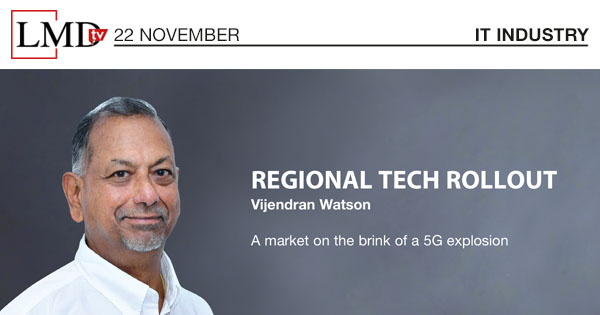LMDtv 2
 Technology has advanced in the Asia-Pacific region, which is on track to be the largest fifth generation (5G) market globally, Vijendran Watson – the Chairman of Headstart and former Managing Director of Mobitel – said, in a recent LMDtv interview.
Technology has advanced in the Asia-Pacific region, which is on track to be the largest fifth generation (5G) market globally, Vijendran Watson – the Chairman of Headstart and former Managing Director of Mobitel – said, in a recent LMDtv interview.
Countries that stand out include South Korea, Japan and China, along with India, “which started later but has commanded one of the fastest rollouts of 5G globally,” he added.
“The Asia-Pacific region definitely leads the world,” he asserted, mentioning that South Korea and Malaysia have achieved speeds of over 500 megabits a second compared to France, which only counts about 200 megabits a second while the UK, Germany, Spain and other European countries record speeds below 150 megabits a second.
Watson also discussed the impact of 5G on industries: “It’s forecasted that 5G will contribute about US$ 2.2 trillion to the global economy by 2034. The key industries that would be impacted are manufacturing, healthcare, transportation, utilities, retail, financial services and the public sector – mainly through digital transformation and digitalisation of many of these services.”
“I think that impact will grow as 5G networks roll out, and more industries want to get into digitisation and automation,” he noted, explaining that AI will increase the impact where “a lot of mundane repetitive jobs will be replaced by machines.”
With the onset and growth of 5G comes the inevitable challenge of network security, and telecom companies are already taking several initiatives to combat the issues that confront them.
However, Watson believes that more should be done: “The problem [for telecom companies] is that 80 percent of traffic is due to applications running on their networks for which they don’t receive any money.”
“The owner or developer of that application gets the revenue, not the network. So 80 percent of the traffic is not paying anything and therefore, [telecom companies] are struggling in terms of their operations,” he claimed, adding that this impacts security as well.
Network operators are being squeezed by not earning the revenue they expected so they’re pushed to look at optimising costs. In this regard, he explained that many use technologies such as the Internet of Things (IoT) and big data for preventive maintenance.
Other technologies like chatbots are also increasingly being used by telecos – especially those with call centres.
Watson stated: “With chatbots, you don’t need to have so many [call centre] stations because a lot of the problems that customers have are repetitive. So these chatbots can provide solutions immediately. With analytics and AI, they’re able to get better and better at the answers they give customers.”
He also spoke about cloud computing: “People and companies now do not have their own servers; they’re putting all their services on the cloud.”
These companies, he noted, “want to increase security; as such, many big companies are now hosting on an alternate cloud so that they don’t have only one host but maybe an alternative. If one goes down, you always have the service operating from the other one – it’s called multi-cloud,” he explained.
So while technological advancements driven by 5G deployment are accelerating, there are several challenges for companies in the Asia-Pacific region to overcome.
Watson noted: “The unique challenge is that I believe every country is a little different. Australia for example, has a population concentrated along the coast but you have vast areas where there is a rural population and it’s a huge geographic space to cover.”
On the other hand, “Hong Kong and Singapore, which are very densely populated, find it easier to roll out 5G networks,” he observed.
Collaboration is key when it comes to the successful deployment of 5G and Watson is optimistic that although it will take time, collaboration will happen, enabling people to enjoy 5G services seamlessly.




